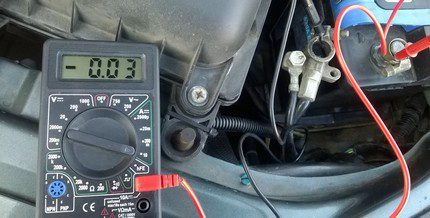
Why does the battery drain in summer?
Content
Discharging the battery in winter is no surprise. Freezing cold, harsh driving conditions ... Even children know that batteries lose capacity faster at low temperatures. But in the summer, the lack of electricity in the car surprised many. What causes the battery to discharge also at high temperatures?
Shortly speaking
Heat is not good for car batteries. When the mercury levels exceed 30 degrees (and you need to remember that in hot weather the temperature under the hood of a car is much higher), self-discharge, that is, the natural, spontaneous discharge of the battery, occurs 2 times faster than in tests conducted at room temperature. In addition, this process is influenced by power receivers: radio, lighting, air conditioning, navigation ... The answer is to follow the rules for proper use, especially when the car is not used for a long time, for example, during holidays.

High temperatures
Ideal battery temperature about 20 degrees Celsius. Large deviations from this norm - both up and down - are harmful. This temperature is considered optimal for storing the battery and it is here that the so-called tests are carried out. self-discharge, that is, the natural process of discharging a battery both during use and in standby mode. This is why car manufacturers and employees recommend storing the battery at room temperature.
However, even 10 degrees is enough battery discharges twice as fast than it should.
It was ... why was it being discharged?
The warmer it is outside, the more intense the chemical processes in the battery.
When the car is in the sun, it's extremely hot under the hood. During the holiday season, these situations occur frequently. If you leave your car in the airport parking lot for a few or even a few days, it will easily self-discharge.
The consequence of this will be not only problems with starting the engine after returning from vacation, but also a decrease in its power and service life.
How can this be prevented? The best thing would be Remove the battery from the vehicle when on vacation and store it in a cool dry place.. Before placing it back under the hood, it is worth checking the voltage and recharging it if necessary.
Of course, this is not always possible. So all you have to do is make sure that you do not leave the car with the battery undercharged or overcharged and that it is really correctly attached, and the pole terminals are securely fastened and secured with a layer of technical petroleum jelly. And that no receivers were turned on in the car ...
"Eaters" of electricity
The newer the car, the faster it can go to it self-discharge of the battery. The thing is not the battery itself, but the number of electrical devices that draw electricity even when the ignition is turned off. If the battery discharges particularly frequently, it's a good idea to make sure that one of the receivers is not damaged and does not "eat up" too much electricity. It may also turn out to be a fault in the electrical system. Better to check all possibilities before a dangerous short circuit occurs. Measurement of the current that the battery supplies to the installation will help, which can be done by an electromechanic.
Give him time to fill up
Not only idle, but also short-distance driving does not serve the battery. Most of the energy stored in it is needed to start the engine, and then the operation of the alternator helps to fill it. For this, however, you need a longer journey at a constant speed. If you only drive your car from home to work and back, the battery will soon show signs of discharging. Control the battery level as often as possible, especially in a car with a start-stop system. Traffic and the necessity of frequent stops puts a heavy strain on the battery in a car with this type of function. The defense against total discharge is not to turn off the engine after stopping - if you notice that despite favorable conditions, the start-stop system does not turn off the ignition, it is better to check the voltage in the battery.
Installation defects
The reason for the troubles with the battery can also be dirty, corroded or damaged cables responsible for charging from the alternator. Too much resistance prevents the battery from filling. When you suspect such a problem, check first of all the ground cable that connects the battery to the car body, which acts as a minus.
Before you leave
After a longer stoppage, check the voltage. It should be 12,6 Vso that you can be sure that your car will not run out of electricity in a moment. For such circumstances, it is worth carrying a voltmeter with you ... and even better a charger that not only measures the voltage, but also recharges the battery, if necessary.
Both the chargers and other accessories necessary in the car in summer and in all other seasons can be found in the store Knock out. Visit us and see how easy and pleasant it is to take care of your car.
See also:
What do you need to have in the car on a long journey?
5 symptoms that the air conditioning is not working properly
avtotachki.com,, unsplash.com